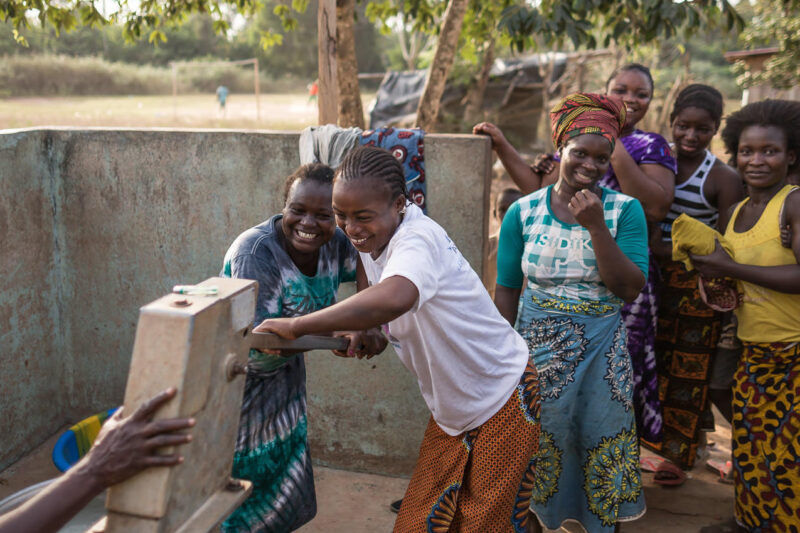Fairtrade initiative aims to drive down increased levels of cocoa-linked child labour

pic: Fairtrade
A major new programme has been launched supporting Fairtrade certified Ivorian and Ghanaian cocoa cooperatives targeting greater prevention and remediation of child labour and forced labour, which remain as significant issues within the key West African supplier nations, reports Neill Barston.
The global organisation, which is set to be among keynote speakers at our World Confectionery Conference on 5 October, has launched its latest initiative amid challenging cost of living crisis conditions, which have further impacted the international industry.
Confectionery Production has previously covered the issue extensively, with sector-wide efforts to positively impact conditions on the ground in West Africa hampered by the pandemic, rising fertiliser costs and downward pressure on cocoa prices – leaving the many farming communities earning below UN-defined poverty wages.
Significantly, the EU is presently putting forward key legislation on supply chains – including for cocoa – which is widely hoped by industry insiders, to prove a milestone for the sector in providing clearly-defined human rights requirements and legal obligations surrounding the sector.
As Fairtrade International and Fairtrade Africa noted, incidence of child labour have reportedly increased during the past decade, with more than 1.5 million children aged five to 17 working on cocoa farms in Ivory Coast and Ghana, according to a 2020 report, which it believes needs to be urgently addressed by major industry stakeholders.
Consequently, its latest drive, the Fairtrade Child Labour and Forced Labour Prevention and Remediation Programme, will disburse funds to successful Fairtrade certified applicants for initiatives that focus on essential but often underfunded elements of strengthening children’s rights and ending harmful practices.
“There has been a great deal of attention paid to monitoring and finding child labour cases in the cocoa sector in Ivory Coast and Ghana especially, which is necessary but not sufficient to really get at the root of the problem,” said Edward Akapire, the Director of Fairtrade Africa’s West Africa Network. “With this new programme, Fairtrade aims to support producer organisations to invest in prevention – such as improving education – as well as remediation of detected cases, which means connecting children and families with resources so that they can thrive, rather than driving harmful practices further underground.”
The Fairtrade Standards prohibit exploitative child labour, and compliance is regularly monitored on site by the certifier FLOCERT. Still, no certification system can provide a 100 percent guarantee that a product is free of child labour. In addition, while many cooperatives now have a monitoring and remediation system in place, they may lack the resources to tackle more expensive prevention and remediation measures.
Notably, the programme is being launched with €450,000 from Fairtrade Germany, Fairtrade Austria and Fairtrade Max Havelaar Switzerland and other Fairtrade organisations, and will be expanded with additional contributions.
In this way, the programme also provides an avenue for cocoa exporters, importers, manufacturers, brands and retailers in Fairtrade cocoa supply chains to support producer organisations to address and remediate child labour and forced labour, which is a new requirement in the Fairtrade Standard for Cocoa.
Taking effect on 1 July 2023, the requirement applies to supply chains that originate in high-risk regions, including Ghana and Côte d’Ivoire. Companies that buy cocoa on mass balance terms, meaning the cocoa can be mixed after it is exported and future buyers don’t know the specific cooperative that produced it, can contribute to the programme to fulfil the Fairtrade Standards support requirement.
Prevention activities such as improving access to quality education for children, and income generating activities that address household poverty, are potential areas the cocoa cooperatives might seek to address. Innovative project ideas based on cooperatives’ experiences and priorities are also an important aspect of the programme’s funding criteria.
Fairtrade expects the programme to finance approximately 10 proposals in the first year. Rigorous monitoring and evaluation to assess the effectiveness of interventions and to share lessons learned will be part of all funded projects. A management committee will provide expertise and the latest knowledge on best practices. The committee includes Matthias Lange, Executive Director of the International Cocoa Initiative (ICI), an organisation dedicated to eliminating child labour in the cocoa sector and a key project collaborator.
“We recognise that the programme cannot cover all the needs for investment in prevention and remediation activities,” emphasised Jon Walker, Senior Cocoa Advisor for Fairtrade International (who spoke at last year’s World Confectionery Conference (see the video interview with him from 2022 here). “However, it will help some cooperatives to fund projects that they consider most urgent on the way to eliminating child and forced labour, and providing valuable learnings for possible scale-up. With the combination of this programme and the requirement for all supply chain actors to support cooperatives, we know we can accelerate positive change that benefits everyone.”
Fairtrade certified cocoa producer organisations in Ghana and Côte d’Ivoire can find more information about the programme and the application process at the Fairtrade Africa website. Traders who want more information on contributing to the fund can contact their local National Fairtrade Organisation.
